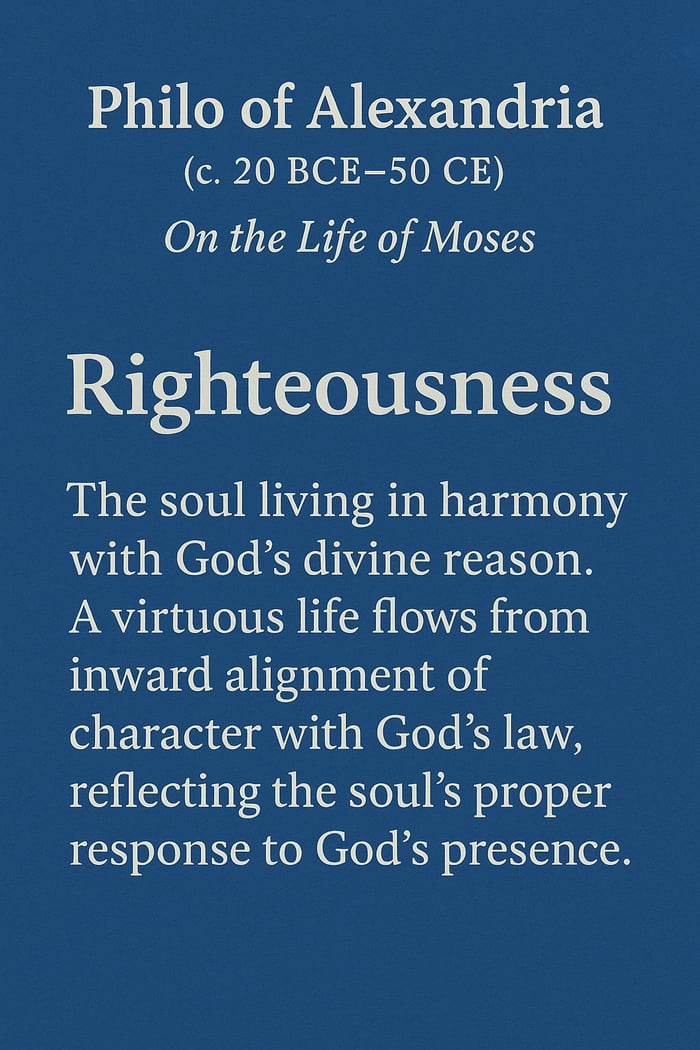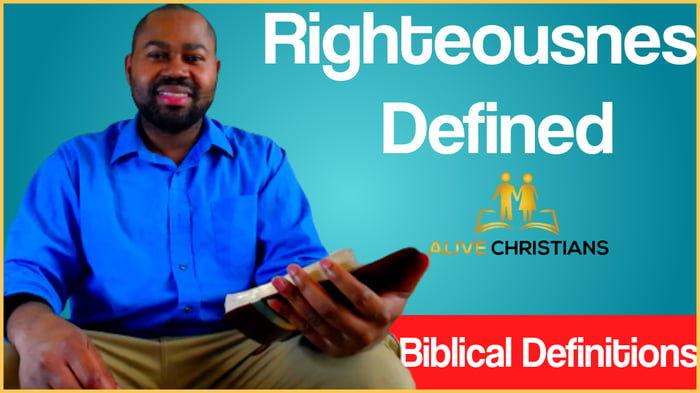Righteousness means being in right-standing or positioning with God. By Faith believers become the Righteousness of God; ie. they are in right-standing with God by the grace of The Lord Jesus Christ that comes through faith. Righteousness is received by grace as a result of faith.
Scriptures That Define Righteousness
- 2 Timothy 2:22 - Flee also youthful lusts: but follow righteousness, faith, charity, peace, with them that call on the Lord out of a pure heart.
- Romans 8:4 - That the righteousness of the law might be fulfilled in us, who walk not after the flesh, but after the Spirit.
- 1 John 5:18 - We know that whosoever is born of God sinneth not; but he that is begotten of God keepeth himself, and that wicked one toucheth him not.
 Philippians 1:11 - Being filled with the fruits of righteousness, which are by Jesus Christ, unto the glory and praise of God.
Philippians 1:11 - Being filled with the fruits of righteousness, which are by Jesus Christ, unto the glory and praise of God. - 1 Peter 3:14 - But and if ye suffer for righteousness' sake, happy are ye: and be not afraid of their terror, neither be troubled;
All entries are summaries and paraphrases of the works of the scholars mentioned.

- Romans 10:4 - For Christ is the end of the law for righteousness to every one that believeth.
- Matthew 5:20 - For I say unto you, That except your righteousness shall exceed the righteousness of the scribes and Pharisees, ye shall in no case enter into the kingdom of heaven.
- Proverbs 2:5 - Then shalt thou understand the fear of the LORD, and find the knowledge of God.
- James 1:4 - But let patience have her perfect work, that ye may be perfect and entire, wanting nothing.
| Scholar (Dates / Work) | Summary of Findings |
|---|
| Philo of Alexandria (c. 20 BCE–50 CE) On the Life of Moses | Philo presents righteousness as the soul living in harmony with God’s divine reason. He emphasizes the inward alignment of character with God’s law, showing that a virtuous life is the soul’s proper response to God’s presence. The righteous man lives according to reason, and in so doing he becomes a companion of God, sharing in the divine likeness |
| Flavius Josephus (c. 37–100 CE) Antiquities of the Jews | Josephus views righteousness as fidelity to God’s commandments, sustaining both personal virtue and communal harmony. The righteous act consistently with divine expectations, cultivating justice in society. A righteous man is he who follows the law of God, who is obedient to justice, and whose life reflects the integrity of the Creator’s order |
| Epistle of Barnabas (1st–2nd c.) Epistle of Barnabas | Righteousness is moral faithfulness in the new covenant, not mere ritual observance. It calls believers to act with love and integrity, reflecting Christ’s teaching in everyday life. The righteous are those who keep the commandments of the Lord and walk in the way of life, serving God with their whole heart |
| Justin Martyr (c. 100–165) Dialogue with Trypho | Justin emphasizes participation in the Logos through Christ as the source of righteousness. Faithful obedience and moral living flow naturally from union with the divine Word. It is through the Logos that we attain righteousness; for he who follows the Word does not sin but is perfected in life and virtue |
| Irenaeus of Lyons (c. 130–202) Against Heresies | Irenaeus teaches that righteousness restores humanity to God’s likeness through Christ’s obedience. Moral integrity is inseparable from faith, reflecting divine harmony in daily conduct. For the righteous are those who are conformed to God through Christ, who walk in obedience and truth, bearing the image of the Creator |
| Origen of Alexandria (c. 185–253) Commentary on Romans | Origen describes righteousness as the soul rightly ordered toward God, enlightened by Scripture. The righteous person cultivates love and truth as guiding principles of life. Righteousness is the soul’s steadfast ascent toward God, guided by love, enlightened by knowledge, and established in truth |
| John Chrysostom (c. 349–407) Homilies on Romans | Chrysostom focuses on righteousness as inner virtue expressed in mercy and compassion. He encourages believers to act in ways that reflect Christ’s moral perfection. The righteous man is not he who abstains from sin alone, but he who pours forth mercy upon all, walking in the footsteps of Christ |
| Augustine of Hippo (354–430) On the Spirit and the Letter | Augustine links righteousness to the right ordering of love, made possible by God’s grace. Faith transforms the heart, producing a life that fulfills the law in spirit and in deed. A man is righteous when he loves God above all and his neighbor for God’s sake; for without love, all works are hollow |
| Bede the Venerable (c. 673–735) Homilies on the Gospels | Bede presents righteousness as proper stewardship of earthly goods and actions, aimed at heavenly purposes. Moral integrity is shown in practical obedience and devotion. The righteous use what is theirs not for themselves alone, but to glorify God and to serve the needs of others in charity |
| Anselm of Canterbury (1033–1109) Cur Deus Homo | Anselm emphasizes satisfaction of divine justice as central to righteousness. Humanity is made right with God through Christ’s atoning obedience, revealing both moral and legal dimensions of righteousness. Righteousness is fulfilled when the debt of human sin is satisfied by the obedience of the Son, restoring the soul to its rightful place before God |
| Peter Lombard (c. 1096–1160) Sentences | Lombard describes righteousness as the habitual ordering of the soul toward God and neighbor. It is cultivated through moral virtues and obedience, harmonizing human will with divine law. Righteousness is the virtue by which the soul is rightly ordered, directing all actions to God and love of neighbor |
| Thomas Aquinas (1225–1274) Summa Theologiae | Aquinas emphasizes that righteousness is both natural and infused by grace, aligning human reason with divine justice. It is expressed in moral acts guided by charity and prudence. Righteousness perfects the will, directing it to act justly and to love God above all, thereby ordering all human acts to their proper end |
| Nicholas of Lyra (1270–1349) Postillae | Lyra interprets righteousness as faithful obedience to Scripture and moral law. He stresses literal fidelity and the cultivation of virtue in daily life. Righteousness is to keep the law of God with integrity, living rightly in both action and thought |
| John Wycliffe (c. 1330s–1384) On the Truth of Holy Scripture | Wycliffe emphasizes righteousness as faithfulness to Scripture and practical holiness. True righteousness transforms the heart and directs life toward God. The righteous are they who believe the Word of God and bring forth its truth in their deeds |
| Martin Luther (1483–1546) Preface to Romans | Luther teaches that righteousness is God’s gift, received by faith alone. This imputed righteousness frees the believer to live in faithful obedience. The righteous shall live by faith alone; it is not by works but by God’s mercy that one is made righteous |
| Philip Melanchthon (1497–1560) Loci Communes | Melanchthon describes righteousness as the fruit of justification, producing moral renewal in life. It blends divine grace with ethical living. Through faith, the believer is justified and the life made righteous by the Spirit, producing good works pleasing to God |
| John Calvin (1509–1564) Institutes of the Christian Religion | Calvin sees righteousness as both forensic and transformative. God counts believers righteous, and grace enables moral conformity in daily life. He is righteous who is clothed in Christ, counted just by God, and renewed in his conduct through the Spirit |
| William Tyndale (c. 1494–1536) New Testament Preface | Tyndale emphasizes that righteousness is received by faith and expressed through obedience. Scripture shapes the heart, guiding conduct toward God. Faith alone justifies, but a faithful heart produces deeds pleasing unto God, showing righteousness in life |
| John Lightfoot (1602–1675) Horae Hebraicae et Talmudicae | Lightfoot highlights covenant fidelity as the essence of righteousness in Scripture. Obedience springs from understanding and devotion to God’s law. Righteousness is the keeping of God’s covenant with a sincere heart, performing His commandments in truth and love |
| Matthew Poole (1624–1679) Annotations upon the Holy Bible | Poole presents righteousness as integrity of both thought and action. It is the believer’s alignment with God’s commands and moral order. The righteous live in harmony with God’s law, their hearts and lives reflecting His will |
| John Owen (1616–1683) Doctrine of Justification by Faith | Owen distinguishes between justification (imputed righteousness) and sanctification (imparted righteousness). Faith receives God’s gift while grace transforms daily living, shaping the believer’s moral character. The righteousness of faith is imputed, but true sanctification flows from it, producing holy actions in the life of the believer |
| Richard Baxter (1615–1691) The Saints’ Everlasting Rest | Baxter describes righteousness as practical godliness, flowing from a heart devoted to God. Daily obedience and mercy reveal the inner work of grace. Righteousness is the fruit of a soul renewed by grace, showing itself in holy living and steadfast love |
| Baruch Spinoza (1632–1677) Ethics | Spinoza interprets righteousness philosophically, as living according to reason and the natural order. Ethical life is the expression of harmony with God’s universal law. Righteousness consists in living according to the laws of reason, understanding the necessity of things, and acting rightly |
| Jonathan Edwards (1703–1758) Religious Affections | Edwards views righteousness as the moral outflow of a heart transformed by divine love. True devotion produces both inward holiness and outward action. The righteous soul is inflamed with divine love, and from this affection flows every holy act and obedience |
| Robert Lowth (1710–1787) Lectures on the Sacred Poetry of the Hebrews | Lowth emphasizes covenant loyalty and moral integrity, highlighting righteousness as a unifying theme of Hebrew poetry. Devotion to God guides personal and communal conduct. Righteousness is faithful devotion to God, manifested in upright living and justice toward others |
| John Wesley (1703–1791) Sermons on Several Occasions | Wesley teaches righteousness as inward holiness expressed through love and good works. Faith inspires active obedience and service. Those who are righteous are sanctified in heart and life, showing love to God and neighbor through every deed |
Watch Video For Something Spiritually Empowering For You On Your Walk with God. Click to turn on the sound!
Get Free Prophetic Word For Your Life
Here's a great quiz to try out!
Want more Bible-based Content? 














